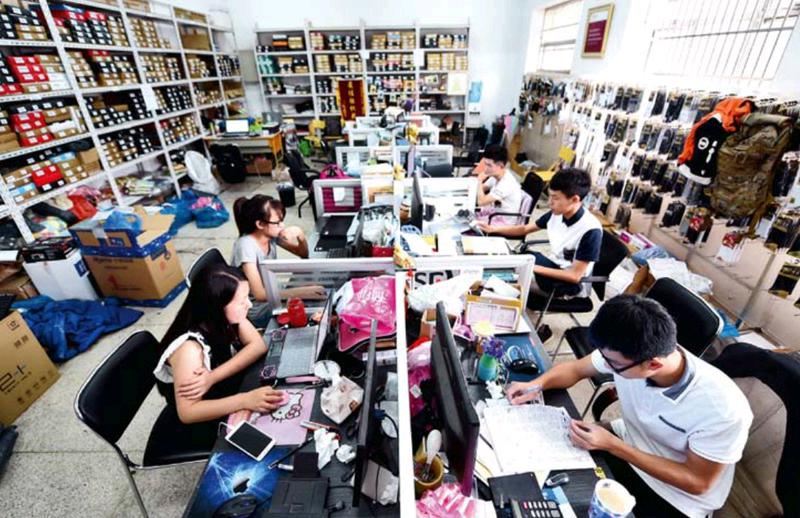Student Startups: Blazing Trails
by+Li+Ping
Wang Pei stood at the en- trance of a Beijing subway station for a while, holding a stack of leaflets. Facing streams of commuters, he felt too embarrassed to deliver any handbills advertising Tree Dinner, a restaurant next to the station. And he is the owner of the restaurant. In April 2014 when the restaurant opened, Wang was still working on a masters degree at Renmin University of China.
In China, many students just like Wang are founding their own business while still in college. On May 14, 2015, the State Council of China issued Opinions on Deepening the Reform of Innovation and Startup Education in Colleges and Universities (hereinafter, “Opinions”), which allows college students to suspend schooling to establish startups.
Internet Startup Boom
Many Chinese college students who start their own businesses idolize U.S. internet gurus Bill Gates, Steve Jobs, and Mark Zuckerberg. Currently, a large volume of startups established by college students in China are internet-related. However, only a few of them have been proven successful. Even so, the internet industry remains the favorite realm for many college startups. “Compared to traditional industries, the internet is hungry for innovation,” opines Wang.
However, the internet itself isnt enough to ensure the success of startups. Before his restaurant officially opened, Wang devoted considerable energy to promoting it on social media platforms such as WeChat. To his surprise, in its first day, the restaurant sold only an eight-yuan fruit cup, which dealt a heavy blow to Wang and his startup team. They changed their business strategy of online promotion and began to advertise the restaurant by offline means, such as handing out leaflets at nearby subway stations, a strategy they considered outdated.
The “internet+” concept has stimulated a number of college startups to embrace the internet industry. It is easy to enter the industry, but difficult to seize success. Enduring the pains of initial failure, Wang has realized that a startup cannot survive without determination to stick to the dream.
School or Startup?
To encourage the development of college startups, the Chinese government has formulated preferential policies in terms of loans and taxation. Most owners of college startups raised funds themselves. It is almost impossible for college startups to win investors favor before they achieve any success. For instance, the initial investment in Wangs restaurant all came from his startup team. Not only did Wang invest his own savings, but so did other members of his team who earned the money working as part-time translators.
Usually, several college students form a partnership to build a startup. This model is not only due to the need for crowdfunding, but also because all partners can easily communicate with each other and ignite flames of innovation by brainstorming, which is helpful to solve problems that often occur in early stages of startups.
Balancing schooling and startups is the most important decision facing all college students operating businesses. According to the Opinions issued by the State Council, all institutions of higher learning around the country shall establish and improve their special bodies to provide instruction and services for students who intend to build startups, enhance the national startup service network for college students, and actively implement policies concerning college student startup training.
For college students who have started their own businesses, they most need support from their own families, which is the most dependable backing possible. Moreover, support from the government, schools, investors, and partners have also become indispensable.
Road to Success
Many doubt how long college startups can survive. Of course, longevity is an important factor to assess whether a startup project or company will be successful or not. However, it is not the only factor.“With changes in the social environment and accumulation of personal experience, sometimes we give up our initial ideas to pursue new ones,” Wang relates.
For college entrepreneurs, they endure trials, correct mistakes, and grow up. They need counseling from tutors, but eventually they need to blaze their own paths.
Following his restaurant project, Wang has begun to work on another startup project aiming to build an internet-based food brand called “A Xiongs Food Factory,”which allows customers to participate in the entire process from food production to consumption. Although Wang and his team didnt stick to their initial idea, they have never given up their dreams of building a great startup.
In this era, the importance of innovation and startups has been given unprecedented priority. So, the time is ripe for college students to build startups. College startups deserve support and recognition from all of society. We hope that one day university startup pioneers will be called the “people who changed the world.”
China Pictorial2015年7期
